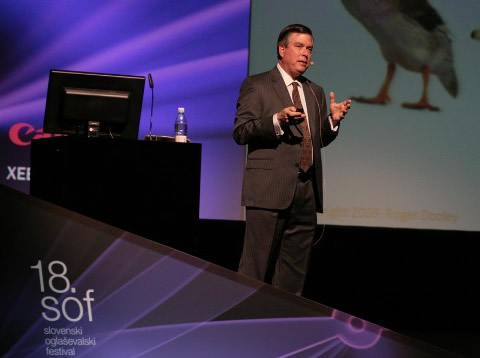Neuromarketing Debut in Slovenia

Well, the Slovenian Advertising Festival has drawn to a close, and I’ve finally got a few minutes to comment on the experience and share some of the things I learned in my few days in Portoroz. First, my Neuromarketing keynote, or “lecture” as seems to be the local translation, went just fine. I was a bit concerned about the language issue – 95% of the conference was in Slovenian, with only a few English segments. It seemed that language wasn’t as big a barrier as I feared. My segment was well attended, almost all hands went up when I asked who spoke English, and when I said something funny the audience laughed. (That doesn’t always happen even with native English-speaking audiences!) Still, I wondered if for this presentatation I should have broken one of the PowerPoint maxims and actually added MORE text to my slides. I speak a bit of Spanish, and I can often comprehend Spanish text better than rapidly spoken words.
My talk included both brain-scan style neuromarketing as well as some of the less high-tech concepts that are accessible by any size business. Here on Neuromarketing, the simplest ideas, e.g., Reflecting on the Mirror and Framing, always seem to be the most popular.
The audiovisual setup and staff at SOF were excellent – despite my arriving on site just an hour before my presentation, not to mention some video incompatibility issues, the techs quickly figured out how to run the whole thing from my laptop, got me hooked up with a wireless mike, and in general made everything run like we had been prepared for days. This photo shows the massive big screen on the SOF main stage:

One thing worried me was the lack of questions from the audience (only one was asked) and the fact that nobody approached me after the talk. At a typical US conference, that would indicate either a lack of interest or that people weren’t paying attention. I found, though, that question and answer segments weren’t common, and that no speaker attracted a throng of people after a talk. In a way this is too bad – I enjoy chatting with attendees after a talk, and often this is a great way to establish a relationship for future discussion. Even as I walked around the conference, I didn’t get many people saying hello and commenting on my talk. It seems Slovenians are reserved. In contrast, at the parties (where things were a bit more, ummm, relaxed) people were more willing to introduce themselves.
See more photos from SOF here. All in all, SOF was a great event – I love watching commercials and seeing innovative ads, and there was lots of creativity in evidence. For a country of 2 million people, Slovenia clearly has some outstanding talent.

